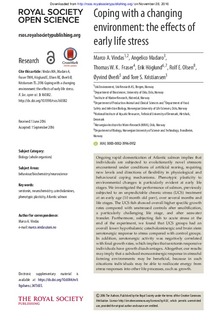Coping with a changing environment: The effects of early life stress
| dc.contributor.author | Vindas, Marco Antonio | |
| dc.contributor.author | Madaro, Angelico | |
| dc.contributor.author | Fraser, Thomas | |
| dc.contributor.author | Höglund, Erik | |
| dc.contributor.author | Olsen, Rolf Erik | |
| dc.contributor.author | Øverli, Øyvind | |
| dc.contributor.author | Kristiansen, Tore S | |
| dc.date.accessioned | 2016-11-28T14:16:07Z | |
| dc.date.accessioned | 2018-03-20T12:21:55Z | |
| dc.date.available | 2016-11-28T14:16:07Z | |
| dc.date.available | 2018-03-20T12:21:55Z | |
| dc.date.issued | 2016 | |
| dc.identifier.citation | Royal Society Open Science. 2016, 3 (10), 160382 | nb_NO |
| dc.identifier.issn | 2054-5703 | |
| dc.identifier.uri | http://hdl.handle.net/11250/2491258 | |
| dc.description.abstract | Ongoing rapid domestication of Atlantic salmon implies that individuals are subjected to evolutionarily novel stressors encountered under conditions of artificial rearing, requiring new levels and directions of flexibility in physiological and behavioural coping mechanisms. Phenotypic plasticity to environmental changes is particularly evident at early life stages. We investigated the performance of salmon, previously subjected to an unpredictable chronic stress (UCS) treatment at an early age (10 month old parr), over several months and life stages. The UCS fish showed overall higher specific growth rates compared with unstressed controls after smoltification, a particularly challenging life stage, and after seawater transfer. Furthermore, subjecting fish to acute stress at the end of the experiment, we found that UCS groups had an overall lower hypothalamic catecholaminergic and brain stem serotonergic response to stress compared with control groups. In addition, serotonergic activity was negatively correlated with final growth rates,which implies that serotonin responsive individuals have growth disadvantages. Altogether, our results may imply that a subduedmonoaminergic response in stressful farming environments may be beneficial, because in such situations individuals may be able to reallocate energy from stress responses into other life processes, such as growth. | nb_NO |
| dc.language.iso | eng | nb_NO |
| dc.publisher | The Royal Society | nb_NO |
| dc.rights | Navngivelse 4.0 Internasjonal | * |
| dc.rights.uri | http://creativecommons.org/licenses/by/4.0/deed.no | * |
| dc.title | Coping with a changing environment: The effects of early life stress | nb_NO |
| dc.type | Journal article | nb_NO |
| dc.type | Peer reviewed | nb_NO |
| dc.date.updated | 2016-11-28T14:16:07Z | |
| dc.description.version | publishedVersion | nb_NO |
| dc.source.pagenumber | 13 | nb_NO |
| dc.source.volume | 3 | nb_NO |
| dc.source.journal | Royal Society Open Science | nb_NO |
| dc.source.issue | 10 | nb_NO |
| dc.identifier.doi | 10.1098/rsos.160382 | |
| dc.identifier.cristin | 1403808 | |
| dc.relation.project | EC/FP7/265957 | nb_NO |
Tilhørende fil(er)
Denne innførselen finnes i følgende samling(er)
-
Publikasjoner fra Cristin - NIVA [2149]
-
Scientific publications [1172]

